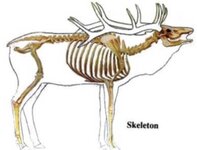I know 10% ballistics gel isn't a 1:1 game, but seeing the objective data between these made me feel better before I dove in. Mostly clueless at reading gel, but I get the basics (neck, penetration, TC, TC length). At high velocity, which should be the worst for match bullets, there isn't a crazy difference in regard to penetration. From a TC size perspective 223 gets you about 4ish", 6.5 gets you about 5.5-6", 30cal gets you about 8". Big difference in total volume, only increases margin for error about an inch in any direction. Slow velocity down at distance and you'll probably get better penetration from how I understand it.
77TMK at 2750
View attachment 635112
6.5CM w/ 147 ELDM at 2700fps
View attachment 635113
6.5CM w/ 147 ELDM through 2 sheets of 20 gauge steel and gel block 18" away...in case the elk is hiding behind a car door
View attachment 635116
300PRC w/ 225 ELDM at 2850
View attachment 635120
For the big vs small debate: 100% not my intention to be preachy or to stir the pot, but for those who shoot big guns well, just a heads up on a quick way to quiet everyone down about your shooting competency. Do the "hunting rifle drill" and post your honest, timed results. 100 yard range is easy to find and will only burn 20 rounds, which is no biggie for good field practice.
This isn’t in response to anyone I particular, but there is an up tick in the amount of “I want a XXXX distance hunting rifle” traffic the last few months. I am getting a lot of questions relating to this, which I do not mind helping, but thought a public post might help answer some questions...

rokslide.com



